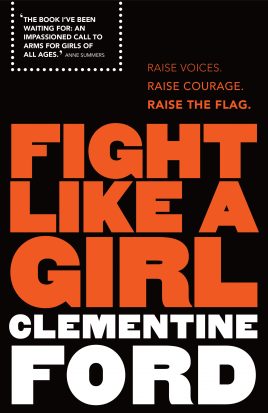 Fairfax columnist and ABC Drum presenter Julia Baird is drawn to forceful, opinionated public women. Baird is writing a biography of Queen Victoria, and in a column this week she extolled outspoken feminist commentator Clementine Ford.
Fairfax columnist and ABC Drum presenter Julia Baird is drawn to forceful, opinionated public women. Baird is writing a biography of Queen Victoria, and in a column this week she extolled outspoken feminist commentator Clementine Ford.
Baird lauds Ford for being a feminist flamethrower, scorching misogynistic trolls of social media wherever they can be exposed for the ugly characters they are. Ford ‘returns like with like, fire with fire, dirt with dirt. It’s a technique that has become hugely controversial, and has been enormously successful in galvanising women’, Baird writes approvingly.
To Baird, Ford is a cultural warrior as well as a feminist one, a Boadicea of the sisterhood taking no quarter in her fight for gender equality. ‘What (Ford) has exposed is that old hatreds of women have condensed on new screens like poison, and as they enter our brains through social media we can carry verbal assaults with us everywhere, in our pockets and into our bedrooms, and this nastiness and grotesquery can shadow our lives. It’s technological warfare. And the rage she provokes shows how important she has become: large crowds swarm around fresh thinkers for a reason’, is how she sums up the Ford method and its effects.
But such apotheosising of firebrand Ford, and by extension other polarising fight-fire-with-fire feminists like the Guardian Australia’s Van Badham and former Fairfax columnist Catherine Deveny (who was sacked for saying things even Fairfax could not tolerate), is based on a false premise: that all men are alike, that all men are misogynists, that all men are predisposed to hating and hurting women.
Social media trolls who hide behind avatars and pseudonyms to spew bile, venom and hate are beyond the pale, irrespective of their sex, religion or politics. But to assume that the surface of any man can be scratched to reveal an ugly and violent misogynist beneath is unfair and wrong. When Van Badham aggressively launched into fellow panellist Steve Price on Q and A earlier this year, goading him into reacting angrily and thereby effectively confirming her underlying message that all men are sexist pigs, she did so to the whoops and wild applause of the admiring studio audience. It was great television and kept social media buzzing for days, but for anyone valuing civility in our society Badham’s comments and the audience reaction were utterly depressing to watch. Intolerance begets intolerance.
The strident, self-righteous and in-your-face views of Clementine Ford, and her outspoken sisters like Badham, should be respected in a pluralist society like ours. In a society valuing freedom of speech they have every right to speak as they do, just as we have every right to disagree vehemently and tell them they’re bonkers. But celebrating them, their tactics, and their apparent ability to match hate with hate? No. Poor behaviour by anyone should never be rewarded, let alone placed on a pedestal.
When tolerance and respect are increasingly in short supply, and the anonymity of social media brings out the worst in a vocal few, public figures returning the fire of those few in kind, and with interest, simply magnifies the intolerance these public figure women claim they are proscribing. If Ford wants to be respected as a woman, she also needs to win respect as a person. If one wants the tolerance, understanding and respect of others, one must reciprocate, not retaliate
Last month, feminist activists gave one of their satirical Ernie awards to Andrew Bolt simply for showing old-fashioned gallantry to his co-presenter of a documentary, Linda Burney. What was intended a compliment was denounced absurdly as offensive sexism: no doubt Ford approved.
Instead of so enthusiastically execrating what she sees as unacceptable trolling behaviour, it would be better if Ford directed her intellect, and her media influence, to understanding why those trolling men she abhors think and act as they do.
She could reflect on the breakneck pace of social and technological change in the last two generations that has empowered billions of women but marginalised many men, especially those without the education and vocational skills to adjust and find a place in this brave new world. She could reflect that for every woman who breaks the glass ceiling, every traditionally male job a woman takes, that there are men who have been displaced, and many more men who fear the same happening to them. And she could reflect that, despite constant feminist laments this is still a man’s world, the social, political and media agenda is utterly dominated by those who have long been marginalised: feminist, gay and indigenous activists demanding what they want (and more) here and now, rejecting evolutionary change as intolerable, and dismissing dissent as bigotry.
Julia Baird’s biographical subject, Queen Victoria, was just as convinced as Clementine Ford of her rightness in all things. Victoria’s selfishness and self-obsession blighted her family and at one point almost destroyed the monarchy. But the Widow of Windsor also valued order, tolerance of difference, manners and correct behaviour. She expected others to rise to her level, and would never contemplate descending to theirs. Surely she would condemn deliberate outrageous conduct, such as Ford’s, that contributed to civil society being much less civil.
Queen Victoria’s sense of propriety is needed more than ever today. Instead of harassing the harassers, perhaps Ms Ford should try to understand why the attitudes of those she deplores are as they are. In doing so, however, she misses that Ford undermines their shared cause by doing what she does in the vulgar way she does it. While Baird questions elements of Ford’s conduct – especially in attacking other prominent women like Miranda Devine and Mia Freedman – she clearly admires Ford’s brazen style.
As for social media, there needs to be more kindness, courtesy and understanding all round. Twitter especially is an ugly place, sheltering some ugly and intolerant people. But when public figures like Ford choose to become vigilante avengers by tormenting the tormentors, they harden rather than change attitudes for the better.
Got something to add? Join the discussion and comment below.
Get 10 issues for just $10
Subscribe to The Spectator Australia today for the next 10 magazine issues, plus full online access, for just $10.

























Comments
Don't miss out
Join the conversation with other Spectator Australia readers. Subscribe to leave a comment.
SUBSCRIBEAlready a subscriber? Log in